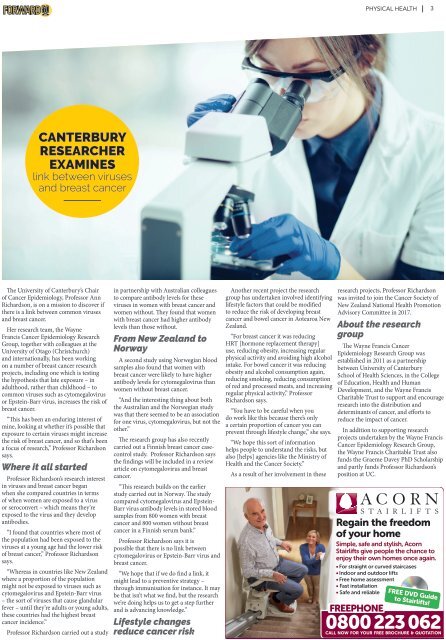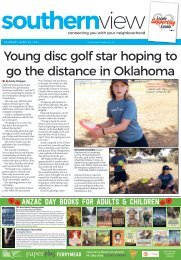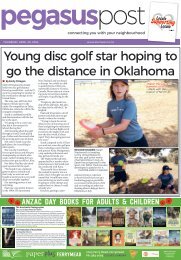The Star: June 28, 2018
You also want an ePaper? Increase the reach of your titles
YUMPU automatically turns print PDFs into web optimized ePapers that Google loves.
PHysical HealtH<br />
3<br />
CANtERBURy<br />
RESEARCHER<br />
ExAmINES<br />
link between viruses<br />
and breast cancer<br />
<strong>The</strong> University of Canterbury’s Chair<br />
of Cancer Epidemiology, Professor Ann<br />
Richardson, is on a mission to discover if<br />
there is a link between common viruses<br />
and breast cancer.<br />
Her research team, the Wayne<br />
Francis Cancer Epidemiology Research<br />
Group, together with colleagues at the<br />
University of Otago (Christchurch)<br />
and internationally, has been working<br />
on a number of breast cancer research<br />
projects, including one which is testing<br />
the hypothesis that late exposure – in<br />
adulthood, rather than childhood – to<br />
common viruses such as cytomegalovirus<br />
or Epstein-Barr virus, increases the risk of<br />
breast cancer.<br />
“This has been an enduring interest of<br />
mine, looking at whether it’s possible that<br />
exposure to certain viruses might increase<br />
the risk of breast cancer, and so that’s been<br />
a focus of research,” Professor Richardson<br />
says.<br />
Where it all started<br />
Professor Richardson’s research interest<br />
in viruses and breast cancer began<br />
when she compared countries in terms<br />
of when women are exposed to a virus<br />
or seroconvert – which means they’re<br />
exposed to the virus and they develop<br />
antibodies.<br />
“I found that countries where most of<br />
the population had been exposed to the<br />
viruses at a young age had the lower risk<br />
of breast cancer,” Professor Richardson<br />
says.<br />
“Whereas in countries like New Zealand<br />
where a proportion of the population<br />
might not be exposed to viruses such as<br />
cytomegalovirus and Epstein-Barr virus<br />
– the sort of viruses that cause glandular<br />
fever – until they’re adults or young adults,<br />
these countries had the highest breast<br />
cancer incidence.”<br />
Professor Richardson carried out a study<br />
in partnership with Australian colleagues<br />
to compare antibody levels for these<br />
viruses in women with breast cancer and<br />
women without. <strong>The</strong>y found that women<br />
with breast cancer had higher antibody<br />
levels than those without.<br />
From New Zealand to<br />
Norway<br />
A second study using Norwegian blood<br />
samples also found that women with<br />
breast cancer were likely to have higher<br />
antibody levels for cytomegalovirus than<br />
women without breast cancer.<br />
“And the interesting thing about both<br />
the Australian and the Norwegian study<br />
was that there seemed to be an association<br />
for one virus, cytomegalovirus, but not the<br />
other.”<br />
<strong>The</strong> research group has also recently<br />
carried out a Finnish breast cancer casecontrol<br />
study. Professor Richardson says<br />
the findings will be included in a review<br />
article on cytomegalovirus and breast<br />
cancer.<br />
“This research builds on the earlier<br />
study carried out in Norway. <strong>The</strong> study<br />
compared cytomegalovirus and Epstein-<br />
Barr virus antibody levels in stored blood<br />
samples from 800 women with breast<br />
cancer and 800 women without breast<br />
cancer in a Finnish serum bank.”<br />
Professor Richardson says it is<br />
possible that there is no link between<br />
cytomegalovirus or Epstein-Barr virus and<br />
breast cancer.<br />
“We hope that if we do find a link, it<br />
might lead to a preventive strategy –<br />
through immunisation for instance. It may<br />
be that isn’t what we find, but the research<br />
we’re doing helps us to get a step further<br />
and is advancing knowledge.”<br />
Lifestyle changes<br />
reduce cancer risk<br />
Another recent project the research<br />
group has undertaken involved identifying<br />
lifestyle factors that could be modified<br />
to reduce the risk of developing breast<br />
cancer and bowel cancer in Aotearoa New<br />
Zealand.<br />
“For breast cancer it was reducing<br />
HRT [hormone replacement therapy]<br />
use, reducing obesity, increasing regular<br />
physical activity and avoiding high alcohol<br />
intake. For bowel cancer it was reducing<br />
obesity and alcohol consumption again,<br />
reducing smoking, reducing consumption<br />
of red and processed meats, and increasing<br />
regular physical activity,” Professor<br />
Richardson says.<br />
“You have to be careful when you<br />
do work like this because there’s only<br />
a certain proportion of cancer you can<br />
prevent through lifestyle change,” she says.<br />
“We hope this sort of information<br />
helps people to understand the risks, but<br />
also [helps] agencies like the Ministry of<br />
Health and the Cancer Society.”<br />
As a result of her involvement in these<br />
research projects, Professor Richardson<br />
was invited to join the Cancer Society of<br />
New Zealand National Health Promotion<br />
Advisory Committee in 2017.<br />
About the research<br />
group<br />
<strong>The</strong> Wayne Francis Cancer<br />
Epidemiology Research Group was<br />
established in 2011 as a partnership<br />
between University of Canterbury<br />
School of Health Sciences, in the College<br />
of Education, Health and Human<br />
Development, and the Wayne Francis<br />
Charitable Trust to support and encourage<br />
research into the distribution and<br />
determinants of cancer, and efforts to<br />
reduce the impact of cancer.<br />
In addition to supporting research<br />
projects undertaken by the Wayne Francis<br />
Cancer Epidemiology Research Group,<br />
the Wayne Francis Charitable Trust also<br />
funds the Graeme Davey PhD Scholarship<br />
and partly funds Professor Richardson’s<br />
position at UC.<br />
Regain the freedom<br />
of your home<br />
Simple, safe and stylish, Acorn<br />
Stairlifts give people the chance to<br />
enjoy their own homes once again.<br />
• For straight or curved staircases<br />
• Indoor and outdoor lifts<br />
• Free home assessment<br />
• Fast installation<br />
• Safe and reliable<br />
FREE DVD Guide<br />
to Stairlifts!<br />
0800 223 062<br />
CALL NOW FOR YOUR FREE BROCHURE & QUOTATION


















